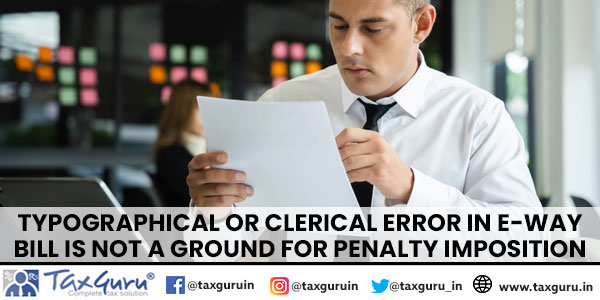Introduction: In a landmark decision, the Allahabad High Court, in the case of Hawkins Cookers Ltd. v. State of UP [Writ Tax No. 739 of 2020 dated February 12, 2024], has addressed the issue of imposing penalties for typographical or clerical errors in e-way bills. This article delves into the facts, issues, and the court’s detailed analysis, shedding light on the implications for businesses. The Hon’ble Allahabad High Court set aside the penalty errors and held that, typographical or clerical error in e-way bill is not a ground for imposition of penalty when most of the required documents are accompanied with the goods supplied.

Facts:
Hawkins Cookers Ltd (“the Petitioner”) is engaged in the business of manufacturing and selling pressure cookers under the brand name Hawkins. The Petitioner purchased/transferred stock of various parts/raw materials for manufacturing of pressure cooker from outside the state of UP where the Petitioner factory is located. E-way bills were issued by the Supplier wherein out of 8 e-way bills issued, only four e-way bills correct place of supply the Petitioner was mentioned. Thereafter, penalty was imposed by the Revenue Department (“the Respondent”) vide penalty order dated February 14, 2020, and appellate order dated October 13, 2020 (“the Impugned Orders”).
Aggrieved by the Impugned Orders, the Petitioner filed writ petition for quashing of the Impugned Orders on the ground that, the said mistakes committed were clerical and typographical errors.
Issue:
Whether typographical or clerical error in e-way bill is a ground for imposition of penalty?
Held:
The Hon’ble Allahabad High Court in the case of Writ Tax No. 739 of 2020 held as under:
- Observed that, for imposition of penalty under Section 129 of the Central Goods and Services Tax Act, 2017 (“the CGST Act”) the intention to evade tax is important. The existence of intention may be presumed by the Department when the rules are not complied with. Further, the presumption of evasion of tax is rebuttable when material pertaining to supply of goods is provided by the owner/transporter.
- Noted that, when there is a typographical or clerical error in the e-way bill, and most of the documents required are accompanied with the goods, a presumption to evade tax does not arise.
- Opined that, mere technical error committed by the Petitioner should not lead to imposition of harsh penalty upon the Petitioner. Therefore, the penalty imposed in the present case is without any imposition of law.
- Held that, Impugned Orders are quashed. Hence, the writ petition is allowed.
Conclusion: The Allahabad High Court, in its ruling, held that typographical or clerical errors in e-way bills should not be a basis for imposing penalties, especially when there is no intention to evade tax. The court quashed the Impugned Orders, highlighting that the penalties imposed were without legal basis. This decision sets a precedent, emphasizing the need for a balanced approach in penalizing errors to ensure fair treatment of businesses.
***
(Author can be reached at info@a2ztaxcorp.com)




